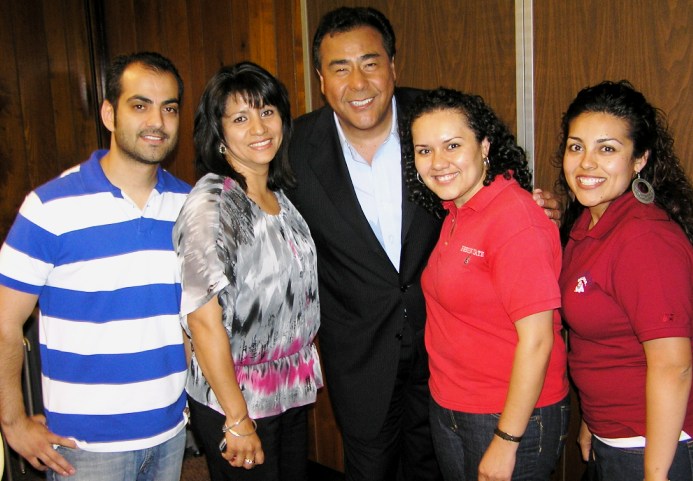
SupportNet academic advisor Janene Avedisian said that while the
program helps address student needs such as study habits and time
management, it also can serve as a forum for personal counseling.
“Sometimes students just need a support system,” she said.
Esteban Cortez / The Collegian
The jump to college can sometimes need assistance
Adapting to the collegiate lifestyle is often a far cry from high school, and Fresno State offers a program to ensure its students make a smooth transition — especially the freshmen.
The program SupportNet emphasizes time management, class preparation and any other study-related barriers that hinder academic success. Students can refer themselves or be referred by a professor if they feel a student is not meeting course expectations.
Under the direction of coordinator Tosha Giuffrida, SupportNet experienced a high turnout in referrals, exceeding 400 percent more than last year, according to its annual report.
“What we do in a nutshell is teach students how to be students,” Giuffrida said.
SupportNet advisors hone in on areas students need to improve in by leading workshops and utilizing the LASSI (Learning and Study Strategies Inventory). LASSI is a diagnosis tool developed at the University of Texas that assesses a student’s aspects of learning, such as anxiety, motivation and time management skills.
“It’s not that students don’t have the intelligence to pass courses,” Giuffrida said. “Most of the time, students are overscheduled. They have problems with time management and they need assistance in prioritizing in general.”
Beyond the LASSI and learning style assessments, SupportNet advisor Janene Avedisian said that the program’s holistic approach is toward fulfilling a student’s individual needs. Sometimes those needs steer the program outside of academics issues.
“A lot of students just come in for personal counseling as well,” Avedisian said. “They just want to talk. It’s not all academic. Sometimes students just need a support system. Sure we start with the LASSI when they come in. But if a student says, ‘Look, I’m really depressed right now,’ we kind of set the whole academics aside and focus on the personal issue that they have.”
Aside from its website and Facebook group, SupportNet attracts students through faculty referrals and a presence at Dog Days orientation. The orientation period helps clarify to students what Giuffrida considers to be one of the toughest transitions from high school to college: study expectations.
“When we do Dog Days presentations and you ask those incoming freshmen, ‘How many hours outside of class do you study,’ most of the time they’ll laugh at you if you even say five hours,” Giuffrida said. “Most incoming freshmen are very used to getting decent, if not good, grades with very minimal time outside of class.”
Dr. Dennis Driggers, a political science professor at Fresno State, empathizes with Giuffrida’s views. The failure rate for his American Government and Institutions
general education course is around 40 percent. He predominantly attributes this towards a lack of study preparation.
“There used to be a standard where students would study two hours a week for every unit they take,” Driggers said. “Students don’t use that standard anymore.”
Driggers is a three-year advocate of SupportNet and said that while he doesn’t send out referrals until after students take their first test, the challenge is getting students to accept help upon referral.
“Most of the students [who are] referred decline and it’s dumb because it’s free help … Bu,t as a professor, I have a right to help and they have a right to decline,” Driggers said.
And although SupportNet’s services are available to every student on campus at any point throughout the semester, the program targets classes with high freshmen enrollment and high failure rates. Only 57 percent of referred students established contact with the program last year, however.
Avedisian said that the program is looking into more efficient ways to connect with referred students besides phone calls and emails.
“It is a struggle,” Avedisian said. “Text messaging would be wonderful, and we’re almost there.”
Giuffrida remains optimistic toward the increased faculty participation that has led to more and more referrals.
“The good news is that each semester we see more and more students,” she said.





